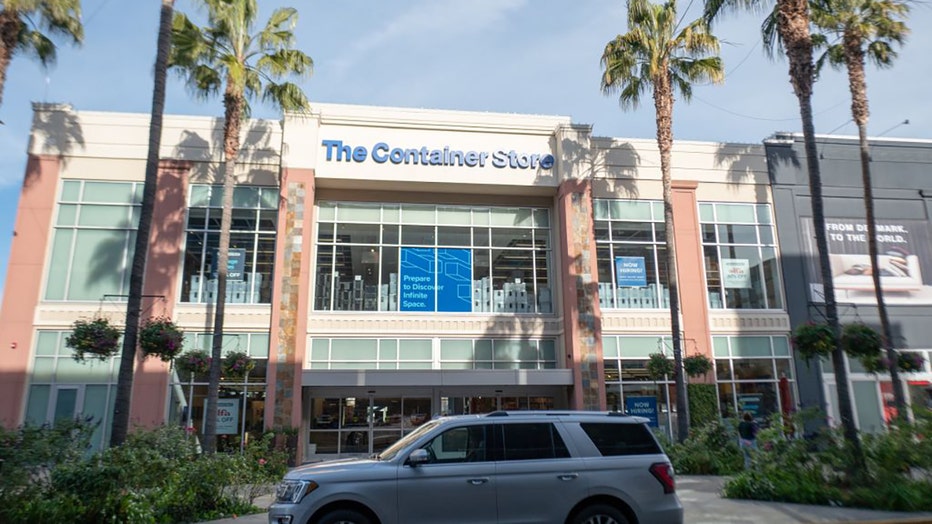The Container Store files for Chapter 11 bankruptcy
COPPELL, Texas - The Container Store has filed for bankruptcy amid a weaker housing market and a growing availability of cheaper alternatives.
The specialty retail chain, which offers a range of custom spaces, organizational solutions and in-home services, said in a statement on Sunday that it filed for Chapter 11 bankruptcy protection to "bolster its financial position, fuel growth initiatives, and drive enhanced long-term profitability."
Under Chapter 11 protection, the store will continue to operate while it restructures.

FILE - Façade of Container Store retail store on Santana Row in the Silicon Valley, San Jose, California, Jan, 3, 2020. (Photo by Smith Collection/Gado/Getty Images)
The Container Store, founded in the late 1970s, at one point gained fame through the success of Netflix's "Tidying Up" series. It is now the latest retailer impacted by consumers cutting back on discretionary spending and has grappled with mounting losses and cash flow shortages.
The company said Sunday that it had filed for bankruptcy protection in Texas. The filing arrives two weeks after the trading of company shares were suspended by the New York Stock Exchange. The Container Store Group Inc. failed to maintain an average market capitalization of at least $15 million in accordance with NYSE rules.
Last month, The Container Store said that it was in advanced discussions with lenders to provide additional capital as it aimed to turn around sagging earnings and sales, according to a regulatory filing.
The company has struggled to raise cash and last month an agreement with the owner of Bed Bath & Beyond, Overstock and Zulily that would have come with a $40 million cash infusion fell apart. The Container Store said in a regulatory filing that it did not believe that it could match the financing requirements of the partnership with Beyond Inc.
The Container Store was founded in 1978 by Garrett Boone, Kip Tindell and investor John Mullen, who opened the doors of The Container Store’s first location in Dallas, according to the company. Neither of the men, Boone with a master’s degree in history and Tindell who was an English major, expected a career in retail. Yet both were driven by the idea of creating a store devoted entirely to storage.
The chain had its skeptics when Boon and Tindell opened their first 1,600-square-foot location. Yet the chain expanded to more than 100 stores ranging from 12,000 to 20,000 square feet, according to the company.
In 1999, The Container Store purchased one of its vendors, Elfa International. In 2021, it acquired Chicago's Closet Works and launched its premium, wood-based line Preston shortly thereafter.
In its most recent quarter the company reported losses of $16 million and comparable store sales, a good barometer of a retailer's health, dropped 12.5%.
The company said in its statement on Sunday that the process is expected to take 35 days to complete. Satish Malhotra, The Container Store CEO, said in a statement that the company is "here to stay."
"Our strategy is sound, and we believe the steps we are taking today will allow us to continue to advance our business, deepen customer relationships, expand our reach, and strengthen our capabilities," Malhotra said. "We are particularly excited about the future of our custom space offerings, which continue to demonstrate strength."
The Source: This story was written based on a statement from The Container Store Group, Inc. on Dec. 22, 2024. It was reported from Cincinnati, and the Associated Press and FOX Business contributed.

